6 Month Old Puppy Peeing In House Again [Quick Solutions]
Has your adorable six-month-old puppy suddenly started peeing in the house again? Just when you think you’ve successfully potty trained your fur baby, they surprise you with their unpredictable bathroom habits. Don’t worry, you’re not alone in this messy situation, and we’re here to help you understand why this may be happening and what you can do about it.
It’s not uncommon for a six-month-old puppy to have accidents in the house. There could be several reasons behind this behavior, such as incomplete potty training, health issues, or simply that their bladder control is still developing. After all, they’re still young and learning!
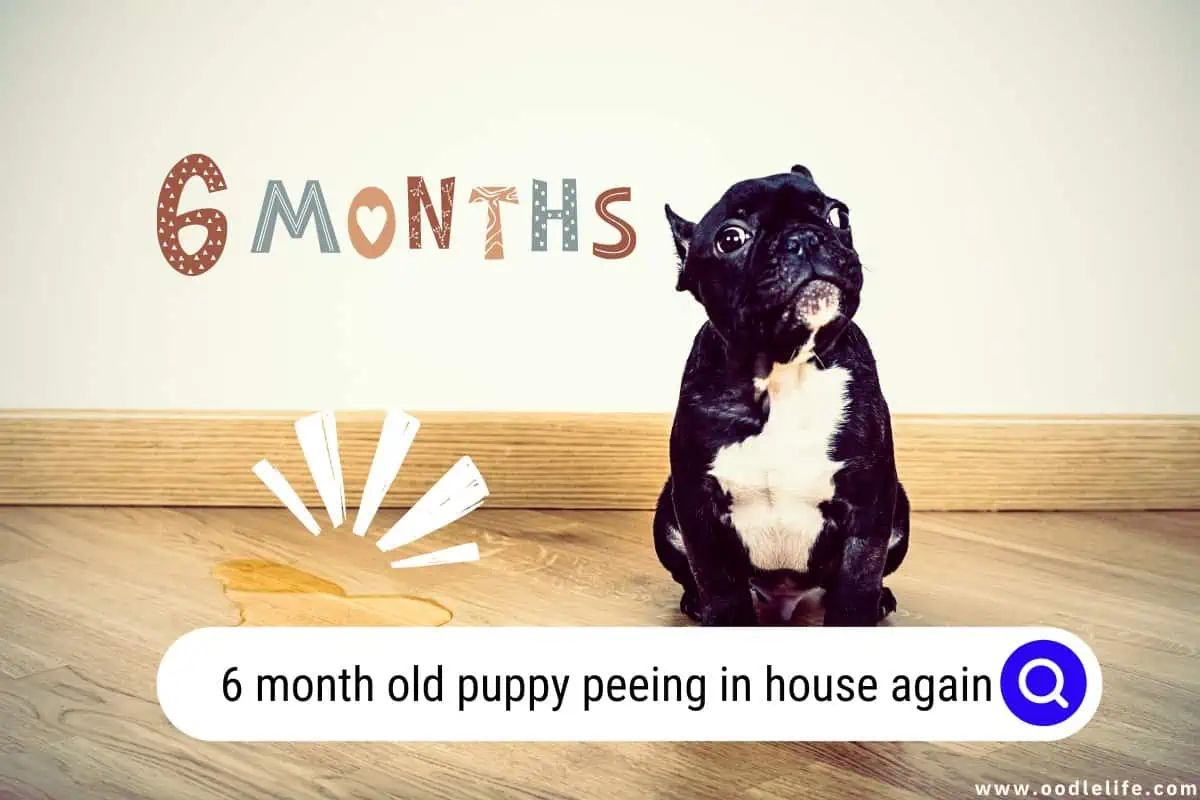
So, grab your cleaning supplies and your sense of humor, and let’s dive into the potential challenges your puppy may be facing and how to overcome them.
Understanding 6 Month Old Puppy Behavior
At six months old, puppies are becoming increasingly curious and playful. Their energy levels are high, and they’re eager to explore the world around them. By this age, some puppies have mastered the art of house training, while others still struggle to fully control their bladders.

An important aspect of puppy behavior is their desire to please their owners. Puppies will often go to great lengths to get their owner’s approval, including learning where to pee. Be patient and consistent with your furry friend to reinforce proper potty behavior.
Remember, accidents can still happen even after months of seemingly successful house training.
In addition to understanding your puppy’s development, it’s essential to be aware of potential medical issues that could lead to accidents in the house, such as urinary tract infections (UTIs). If you notice any unusual behavior or signs of discomfort when your puppy is urinating, consult your veterinarian as soon as possible.
Lastly, let’s not forget the power of distractions. Puppies, like human toddlers, can easily get sidetracked by an exciting new toy or the sight of a squirrel outside the window. Keep your puppy on a routine schedule for bathroom breaks, and they’ll be more likely to stay focused on the task at hand.
Just think of it as a “paws” for all that boundless energy!
Identify the Reasons for Peeing in the House
As a puppy parent, you might be experiencing déjà vu when your six-month-old fur baby starts peeing in the house after being potty trained. But don’t panic just yet! Several factors could be contributing to this behavior, and here we’ll delve into some common reasons.
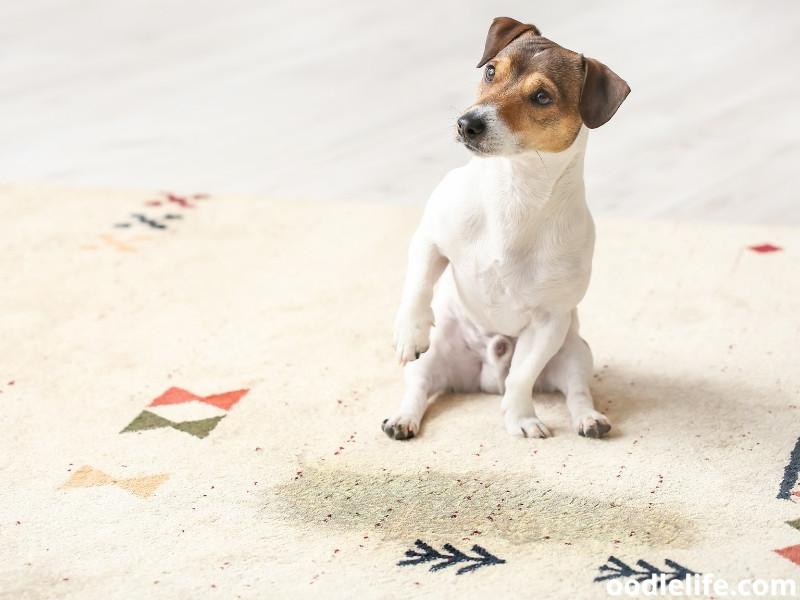
Incomplete Potty Training
Though you may have thought your puppy was fully potty-trained, they could still be struggling to grasp the concept. Like learning to ride a bike, accidents can happen in the process. Be patient and consistent with training to help your pup retain those good habits.
Medical Issues
Before pointing the finger at your puppy’s behavior, rule out potential medical issues. For example, urinary tract infections are common in dogs and could lead to accidents in the house. It’s always a good idea to consult with your vet to ensure your furry friend is in good health.
Separation Anxiety
When you’re away, your pup might miss you a little too much, leading to some “emotional tinkling.” Dogs with separation anxiety exhibit a variety of behaviors, including accidents, excessive barking, or even destructive scratching. Fret not!
There are methods to manage and alleviate your pup’s anxiety.
Submissive Urination
Your pup might be looking up to you, quite literally! Submissive urination occurs when a dog feels overwhelmed or intimidated, for example, during discipline or when greeting a larger, more confident dog. Along with training, offering a calm and gentle approach can help curb this behavior and maintain a puddle-free home.
Fixing the Problem
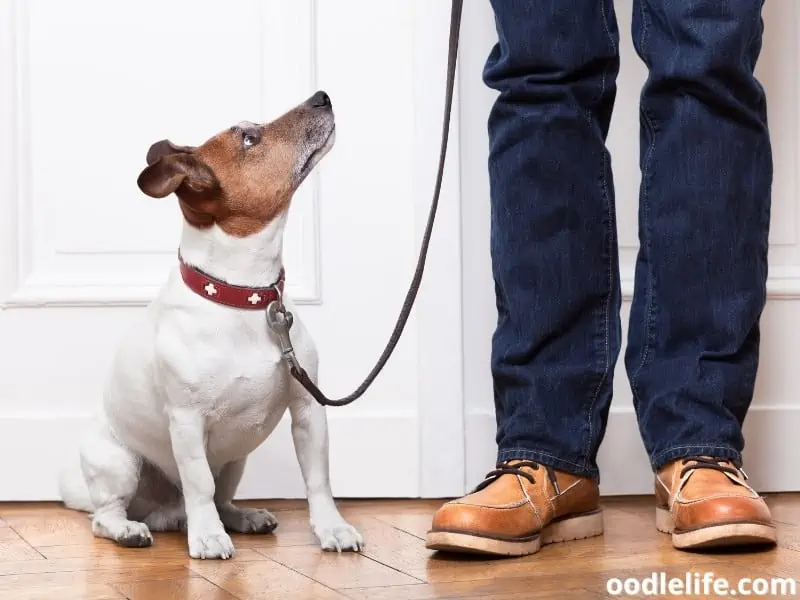
Reinforcing Potty Training
To address the issue of your puppy peeing inside the house, first, revisit the basics of potty training. Monitor your dog’s daily schedule, noting when they eat, drink, sleep, and wake up. Maintaining a routine and taking them outside accordingly can help prevent accidents.
Patience and praise in this process can make learning more enjoyable and effective for your furry friend.
Addressing Medical Concerns
If the peeing persists despite consistent potty training, there might be an underlying medical issue, such as a urinary tract infection. In this case, consult your veterinarian, who will likely perform a urinalysis to evaluate your puppy and recommend appropriate treatment – because even puppies need some professional help sometimes.
Dealing with Separation Anxiety
Separation anxiety could also be causing your puppy to pee indoors. To help ease their distress, gradually increase the time spent away from them, offering rewards for their calm behavior. Creating a comfortable, stress-free environment for your puppy might just spare your carpet a few stains and save you some cleaning supplies.
Managing Submissive Urination
Is your pup a little too excited when guests arrive, causing them to pee out of sheer joy? This is known as submissive urination. To manage this, instruct guests to calmly and quietly interact with your puppy, allowing your pet to approach them instead of the other way around.
With time and practice, your adorable furry friend will likely learn to keep their excitement – and their bladder – under control.
Preventative Measures
Stopping your six-month-old puppy from peeing in the house can be achieved by using several preventative measures. This section will discuss strategies such as establishing a routine, utilizing crate training, providing adequate exercise and socialization, and cleaning up accidents properly.
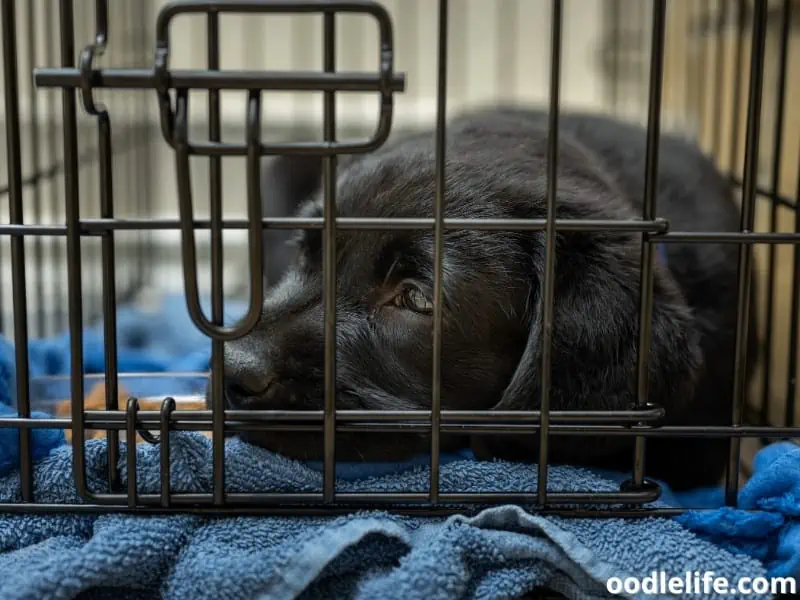
Establish a Routine
A consistent routine is vital for puppies to learn when and where they need to do their business. Note the time when your puppy eats, drinks, sleeps, and wakes up. With that information, create a predictable schedule for potty breaks, gradually spacing them out as your pup matures and gains bladder control.
Utilize Crate Training
Implementing crate training can be beneficial in establishing good potty habits. Puppies usually avoid soiling their sleeping area, so leveraging a crate as a comfortable and safe space encourages them to hold it until they’re outside. Remember to keep crate time reasonable and provide frequent potty breaks, especially for young puppies.
Provide Adequate Exercise and Socialization
Ensuring your puppy gets enough physical exercise and social interaction is essential for their overall well-being. A well-exercised pup is less likely to experience boredom or anxiety, which can contribute to indoor accidents. Furthermore, socialization helps develop confidence and reduces stress-related behaviors.
Clean Up Accidents Properly
When accidents happen, it’s crucial to clean the area thoroughly to remove lingering odors. Dogs have a keen sense of smell and may return to the same spot if they can still detect the scent. Using an enzymatic cleaner specifically designed for pet stains will help break down the proteins and prevent future occurrences.
When to Consult a Professional
As puppy parents, we’ve all had moments where we question if “Doc McPuppin’s” veterinary degree is just a chew toy in disguise. However, if your six-month-old fur baby starts peeing in the house again, there might be a time when you should seek professional advice.
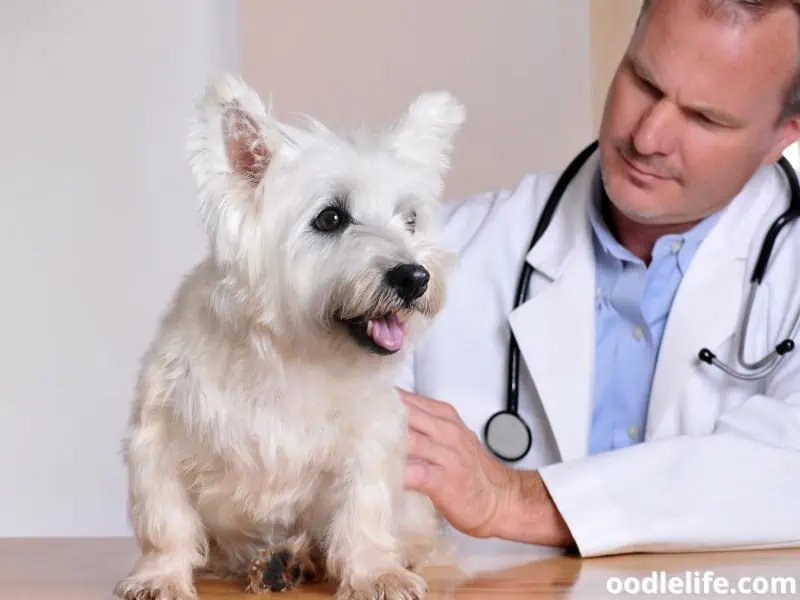
Keep an eye out for red flags like frequent urination, straining to pee, blood in the urine, or visible pain. In cases like these, it is essential to take your little one to the vet, as these symptoms might indicate underlying health issues such as urinary tract infections.
Moreover, when all your diligent training starts resembling a game of fetch without the fetching, a professional dog trainer might be your saving grace. They’ll not only prevent you from going mutts but also help identify any behavioral issues contributing to the indoor potty problems.
So remember, dealing with pee whiz-nuisance doesn’t have to be a solo battle. When things seem too ruff, seek the help of your trusted vet or a professional trainer, and turn that pee-ky situation into a puddle-free future.